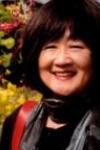Yoshiko Maruyama
Senior Lector in East Asian Languages and Literatures
 Yoshiko Maruyama, B.A. International Christian University, M.A. Teacher’s College, Columbia University in Applied Linguistics, faculty member at Yale since 1988: Three women have been the central pillars of Yale’s Japanese language program since the early postwar period: Hamako Ito Chaplin, Chie Chao (Chee-eh Jow), and Yoshiko Maruyama, and all three achieved remarkably long and admirable records of service on campus and beyond.
Yoshiko Maruyama, B.A. International Christian University, M.A. Teacher’s College, Columbia University in Applied Linguistics, faculty member at Yale since 1988: Three women have been the central pillars of Yale’s Japanese language program since the early postwar period: Hamako Ito Chaplin, Chie Chao (Chee-eh Jow), and Yoshiko Maruyama, and all three achieved remarkably long and admirable records of service on campus and beyond.
You, “Maruyama-sensei,” have taught Japanese to Yale students at every level and through many transitions in teaching methods brought about through technological innovation, wisely, gently but forcefully guiding your colleagues—always working as a team—through those challenging adaptations with caution, care, and high standards while always regarding students’ needs and interests as foremost. As a result, for decades, Yale students of Japanese going off on Richard U. Light Fellowships to study in Tokyo, Kanazawa, Kyoto, or Hokkaido were consistently reported as “best in class” and better prepared than their Ivy peers. In your classroom, a student always knew to expect a warm and welcoming smile as the prelude to “tough love”: no one ever said that learning Japanese with you was easy but it was always rewarding—and often, fun. You brought haiku poets to campus, presided at Japanese tables in Silliman, Timothy Dwight, and elsewhere, and, after the devastating earthquake, tsunami, and nuclear-plant meltdown of March 2011, you worked as adviser to the Japanese-students-at-Yale club in their efforts to give comfort and counseling to high school students in the affected region.
Maruyama-sensei, you brought your high standards to the table, along with your insights into the learning habits and goals and dreams of Yale students as a long-time member of the Richard U. Light Fellowships Executive Committee, and you made many “site visits” to Light-approved programs in summers and during fall or spring breaks. You also provided leadership on the advisory committee of the Japanese Language Teachers Association of New England (JLTANE, “Jell-Tane”) from 2010 to 2013 and served as chair of its annual conference in 2011. A loyal fellow of Morse College, you served for several years as an adviser to first-year students in the college.
As Yale’s Japanese language faculty enters a period of transition and change with the departure of several long-time stalwarts, we know that you look forward to spending more time with your grandchildren here in New Haven and to checking up now and then on how things are going in the offices on Temple Street, the classrooms on York, and at the Center for Language Study. Many in this room may not know that the word “sayonara,” which most of us would be likely to come up with for “goodbye” in Japanese, actually means something along the lines of “well, if that is the case…we shall part, I guess, for now”; but for you, Maruyama-sensei, we would much rather say “mata sugu”: See you soon!